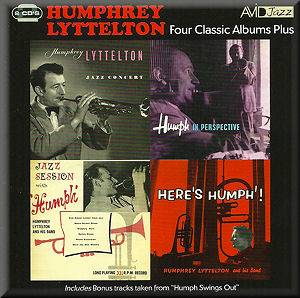CD1
Jazz Concert
1. Panama Rag
2. Trouble In Mind
3. Tom Cat Blues
4. On Treasure Island
5. 1919 March
6. Wolverine Blues
7. Original Jelly Roll Blues
8. Down Home Rag
9. Cake Walkin' Babies (from Home)
10. Get Out of Here (and Go On Home)
Jazz Session with Humph
11. One Sweet Letter from You
12. Beale Street Blues
13. Slippery Horn
14. Dallas Blues
15. Blues Excursion
16. Shim-me-sha-wabble
Humph Swings Out
17. Why Was I Born?
18. Christopher Columbus
19. That's My Home
20. Swing Out
CD2
Humph in Perspective
1. Weary Blues
2. Trouble in Mind
3. Irish Black Bottom
4. Out of the Gallion
5. Struttin' With Some Barbecue
6. In-Swinger
7. Big Bill Blues
8. Black Beauty
9. Black and Blue
10. Unbooted Character
Here's Humph!
11. Apex Blues
12. You Brought a New Kind of Love to Me
13. I Want a Little Girl
14. Jersey Lightning
15. Rockin' Chair
16. Someone Stole Gabriel's Horn
17. Just Squeeze Me
18. Ole Miss Rag
Humph Swings Out
19. Glad Rag Doll
I noted in an earlier review of a Humphrey Lyttelton album that my father used to say that Humph's bands worked their way through the history of jazz - moving from revivalism to trad and thence gradually to mainstream and even "modern". This double CD is an illustration of the fact, since it collects together four LPs (plus parts of a fifth) from the 1950s which show that, even then, Humph was developing his style in new directions.
As sadly with many of these Avid compilations, the discographical details are incomplete, lacking release dates. However, it seems that Jazz Concert was released in 1953, Jazz Session with Humph and Humph Swings Out in 1956, Here's Humph! in 1957, and Humph in Perspective in 1958. I have omitted the personnel details because they are so intricate, with added difficulty in reading them because of the extremely small print (the compilers are obviously the sort of people who could write the Lord's Prayer on the head of a pin!).
The first LP is called Jazz Concert but there is little sign of an audience being present. These 1953 tracks typify the traditional style of the Lyttelton band at that period, so traditional that you could apply the label "revivalist" to it. The band plays old warhorses like Trouble in Mind and Wolverine Blues, keeping faithfully to the methods of early jazz. Some of the recordings have a boxy ambience which makes them appear even more old-fashioned. Panama Rag shows how Lyttelton modelled his trumpet style on that of his idol: Louis Armstrong, although his playing never reached the heights of sheer abandon that Satchmo often reached. Indeed - dare I say it? - Humph's playing could be a bit too polite. You can take the boy out of Eton College but perhaps you can't take his upbringing out of the man! Lyttelton always shaped his solos with care but seldom seemed to let himself go to the utmost.
Nonetheless, Humph's band was often invigorated by the other soloists, some of whom had idiosyncratic personalities and very individual styles. One frequent member of the early Lyttelton groups was Wally Fawkes, an excellent clarinettist who also collaborated with Humph on the strip cartoon "Flook" for some years. Fawkes supplies good solos on such tracks as Cake Walkin' Babies and interleaves harmoniously with fellow-clarinettist Ian Christie in Get Out of Here.
Another distinctive player was altoist Bruce Turner, whose inclusion in the band led to accusations of being a "dirty bopper". He is heard to advantage in three items on Jazz Session with Humph and the five bonus tracks from Humph Swings Out, where one can hear hints of Lyttelton's gradual advance towards modern jazz. Yet most of the remaining tracks in this collection could be labelled "Mainstream".
The second CD seems to advance into swing (Humph always tended to be cautiously behind fashion), with a three-piece sax section which creates the effect of a big band. The saxes include Tony Coe (on Hodges-like alto) and Joe Temperley on baritone. Their presence illustrates Humphrey's ability to pick skilful, sympathetic musicians - an ability which continued in all Humph's bands thereafter.
The LP Humph in Prspective included two originals by Lyttelton - In-Swinger and Big Bill Blues, displaying his talent as a composer. There are also a couple of Duke Ellington tunes: Black Beauty and Unbooted Character. The former contains fine solos from Temperley and tenoriost Jimmy Skidmore. Ellington was a continuing interest throughout Humph's life, as is clear from the Duke's Slippery Horn on the first CD and Just Squeeze Me later on the second CD. Out of the Gallion (by Mezzrow & Bechet) has the aura of Ellington's Mood Indigo.
The final LP - Here's Humph - appears to go backwards towards revivalism, starting with Apex Blues and moving on to I Want a Little Girl and Ole Miss Blues. Such choices indicate how Lyttelton was eternally aware of jazz tradition and the riches it contained. You Brought a New Kind of Love to Me has the easy-going informality of Eddie Condon's groups of the forties and fifties.
Humphrey Lyttelton's death in 2008 was shocking as well as sad, because one felt that he should go on playing and promoting jazz forever. This generous album provides a salutary reminder of some of his early achievements.
Tony Augarde
